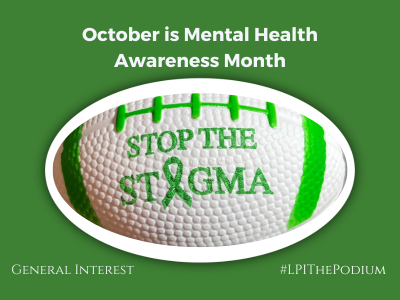
She started crying and could not stop. The overwhelming sadness and feeling out of step with life, family, friends, work, etc., was draining. She had no energy, and fatigue consumed her body. Nothing made sense. She wanted to reach out, to tell someone how she was feeling and what was going on with her, but it all seemed like SO much. If she couldn’t deal with what was going on with herself or understand it, how could anyone else be expected to? How could she burden someone with all of that, knowing they couldn’t help? She felt guilty just thinking about it. Still, she wished someone would reach out – – just ASK – – so that she didn’t feel alone. So, she distanced and isolated, internalized everything, ruminated endlessly, even at times allowing the frustration and desperation she felt to manifest itself in self-harming ways.
She went to work at her law firm every day and presented what she thought was a “normal” face to the world, although it was apparent to all that something was not right. But no one asked. She was “counseled” by her human resources/office manager and told that whatever was going on with her was making others “uncomfortable,” that people in the office felt she was “unapproachable,” and it was interfering with her work. Confiding in her office manager about what she had been dealing with, she asked for time off to try and seek professional help. She was told that the office could not accommodate her request and that she would have to make her treatment work around her job. She asked the office manager, who had recently returned to work after a serious and debilitating medical condition, why her situation was any different? Why was accommodation made for the office manager, but she was being denied the same accommodation? The office manager’s response was, “I had a life-threatening condition.” She got up to leave, turned to the office manager, and said, “So do I.”
The above is a true story. The blatant bias towards mental health versus traditional medicine is rampant and, sadly, remains prevalent throughout our society. It is a perfect example of the ignorance, lack of compassion, and lack of understanding that many suffering from mental illness continuously face. It is also a perfect example of why those who deal with mental illness have difficulty sharing or reaching out for help.
Imagine for a moment that you have received a diagnosis of a serious illness such as cancer, Parkinson’s Disease, multiple sclerosis, etc. The reaction, level of compassion and outreach you receive would not only be significant, but it would also be affirming of your value and importance as an individual, colleague, friend, etc. No one would dare deny you workplace accommodation for treatment, time off, or even disability leave. Now imagine that you receive a diagnosis of bi-polar disorder, severe depression, anxiety disorder, or other serious illness. What do you think the reaction, level of compassion and outreach would be then? Would you still feel the same affirmation of value and importance? Would you still be granted workplace accommodation? The fact that these questions even have to be asked is more than concerning.
What is the difference between the two above scenarios? Both diagnoses are serious and disabling. Both diagnoses require professional treatment, medication, and monitoring. Both diagnoses affect the patient’s quality of life. The answer is there is no difference. Yet, society at large treats them differently and places greater significance on the diagnosis of something like cancer over a diagnosis of something such as major depression. The term “disorder” on its own lends itself to prejudice and discrimination.
The response of the human resources/office manager, and her treatment and attitude toward the employee in the opening example should never occur. The idea that a person would play one-upmanship with illnesses is simply incomprehensible, especially coming from a person whom the office relies upon, and pays, to ensure that employee rights are protected.
As members of the legal profession, we have a duty to safeguard and defend the rights of those who face health challenges, regardless of whether they are medical or mental health conditions. We also, having a greater education of the statutes enacted to protect these members of society, should practice a greater level of understanding as well as a greater level of respect and compassion for these individuals.
The stigma attached to mental illness is real. It is as though, once a person reveals their illness they become permanently labeled, that they are somehow now viewed as defective, and stripped of value as a human being. A person’s diagnosis, whether medical or mental, should not be their identity. We need to remember that.
It is a requirement in California that employers provide workplace harassment and discrimination training to their employees. Mental health needs to be part of that conversation and education. The greater our level of awareness and education, the better our response can be to treat EVERY individual with respect, dignity, and value.
Categorized in: General
| << previous | next >> |








